Kalinovka Jewish Farmers on Russian Fields - JewishGen KehilaLinks
Kalinovka Jewish Farmers on Russian Fields - JewishGen KehilaLinks
Kalinovka Jewish Farmers on Russian Fields - JewishGen KehilaLinks
You also want an ePaper? Increase the reach of your titles
YUMPU automatically turns print PDFs into web optimized ePapers that Google loves.
<str<strong>on</strong>g>Kalinovka</str<strong>on</strong>g><br />
<str<strong>on</strong>g>Jewish</str<strong>on</strong>g> <str<strong>on</strong>g>Farmers</str<strong>on</strong>g> <strong>on</strong> <strong>Russian</strong> <strong>Fields</strong><br />
(translated from Hebrew)<br />
by Brynne Licthman<br />
Sifrat Poalim, Ltd. 1965<br />
(Attempts have been made to c<strong>on</strong>tact the rights holders for this material, but Rose Feldman was unable<br />
to locate them. If you believe you have rights to this material, please c<strong>on</strong>tact Rose Feldman<br />
<str<strong>on</strong>g>Kalinovka</str<strong>on</strong>g> was in the province of Podolia, close to the town of Litin, that in<br />
the eyes of the residents of <str<strong>on</strong>g>Kalinovka</str<strong>on</strong>g> was thought of as a “big city”. Vinnitsa, the<br />
closest city to Litin was in their eyes <strong>on</strong>e of the cities of the realm – a metropolitian.<br />
Although in the eyes of the rest of the world, Vinnitsa wasn’t a big city, and when it<br />
was captured by the Germans they didn’t bother to boast of it’s capture and just<br />
announced that “their armies had advanced”.<br />
There was <strong>on</strong>e street in <str<strong>on</strong>g>Kalinovka</str<strong>on</strong>g> with 20 houses, but even though it was tiny<br />
it was “all the world” for its residents. I was 12 years old when I left it, and all her<br />
residents left it.<br />
The settlement was founded in the times of the “cant<strong>on</strong>ists 1 ”. A group of Jews<br />
settled there, that had served a l<strong>on</strong>g period in the Czar’s army and they were promised<br />
as owners of land their children would not be kidnapped to serve in the army.<br />
My mother, Feiga Adler “blessed be her memory”, was the third generati<strong>on</strong> in<br />
the settlement. Her sisters married and moved to other settlements, and my<br />
grandfather’s land was divided between her and her brother. My father, Meyer<br />
Astitas, came to the settlement from Berdichev. He learned farming from my<br />
grandfather, married his daughter and settled there. My parents had a parcel of land<br />
the size of 25 desyatins 2 , of which 50 dunun 3 was marshland and the rest was good<br />
farmland. Our house was surrounded by gardens of fruit trees and vegetables, and a<br />
parcel of fields crops. We had a barn with 12 cows and geese and chickens. We grew<br />
sugar-beets that were sent to the sugar factory in the city Lizni. In comparis<strong>on</strong> to the<br />
neighboring villages Bagrynovich (maybe Vor<strong>on</strong>ovicja), Majdan, Novoselizta and<br />
Lesarka, <str<strong>on</strong>g>Kalinovka</str<strong>on</strong>g> was a prosperous settlement.<br />
Those villages supplied the hired workers for the seas<strong>on</strong> when many hands<br />
were needed and for the picking of the beet harvest. The cow herder also came from<br />
<strong>on</strong>e of those villages. We sent the milk to Litin, and the milk products (butter and<br />
cheese) were bought by merchants from Odessa and Kiev. Except for oil and salt we<br />
didn’t need a thing; our farm supplied all our food: wheat, grain, vegetables, fruit,<br />
milk and even meat. The surplus fruit of our land was pickled in barrels in the<br />
basement for use through out the year. During the l<strong>on</strong>g winter days we would sit in<br />
the houses, we force feed the geese and prepared barley and crushed food for the<br />
cows. In the evenings we would gather in the house of <strong>on</strong>e of the residents: the hosts<br />
would bring up from the cellar a pail full of “kovasnitsas 4 ” in h<strong>on</strong>or of the guests. The<br />
1 “cant<strong>on</strong>ists” when the quota required for boys to serve in the army was not filled, boys were<br />
kidnapped, somethings as young as the age of 12. Their years if service in the army were counted <strong>on</strong>ly<br />
from the age of 19.<br />
2 “desyatins” - 1 desyatin = 2.9 acres; they had about 70 acres<br />
3 “dunum” - 1 dunum = 1,000 square meters. The marsh was about 15 acres.<br />
4 “kovasnitsas” – some sort of pickled delicatess
women baked potatoes that were served with saurer kraut or pastery filled with<br />
cabbage. The children sat near the adults and prepared their less<strong>on</strong>s. All the children<br />
learned to read and write, Torah and arithmetic (in yiddish), from the “melamed” 5 .<br />
The “hedar” 6 and the melamed moved from house to house. Each resident hosted<br />
them for 4-6 weeks. (One of our melameds, the elderly Shlomo Kotin, lives today in<br />
Haifa.). All the children from the ages of 3 to 18, sat <strong>on</strong> l<strong>on</strong>g benches and studied<br />
together. The special thing in this “hedar” was that boys and girls studied together.<br />
Those am<strong>on</strong>g us that were thirsty for knowledge c<strong>on</strong>tinued their studies in the<br />
public school in the village of Meidan and after that went to Litin and even to Odessa.<br />
One of the boys, the s<strong>on</strong> of the Strangus family, studied medicine in Kiev and when<br />
he finished his studies he immigrated to America.<br />
In additi<strong>on</strong> to their studies, the children had tasks to do <strong>on</strong> the farm: feeding<br />
the cows, harvesting and hoeing, and mainly bringing water from the well in the<br />
valley and bringing it all the way up to the settlement <strong>on</strong> the mountain.<br />
On Shabat and “good” days 7 the residents would change from their work<br />
clothes to “kaputas” 8 of satin and gather at the synagogue that stood in the center of<br />
the street, with the ark covered with a red velvet curtain embrodiered in gold and<br />
decorated scrolls of the Torah. The residents were orthodox and c<strong>on</strong>scientously keep<br />
all the “mizvot” 9 .<br />
Once in a while there would be a visitor with a “blue collecti<strong>on</strong> box” 10 . Under<br />
this influence my father put up our land for sale and wanted to immigrate to Eretz<br />
Israel. In the meantime, the first world war broke out, and all those who were of age<br />
were recruited. My brother Shmuel served two years at the fr<strong>on</strong>t and returned to the<br />
settlement at the time of the revoluti<strong>on</strong>. When he returned he organized a self defence<br />
group.<br />
The outbreak of the progroms could be seen <strong>on</strong> the horizi<strong>on</strong>. One evening the<br />
neighboring villages of the settlement were attacked. They gathered all the residents<br />
in <strong>on</strong>e house and locked them in. One of the children escaped through a window and<br />
called the defence group. They had <strong>on</strong>ly three rifles, but their shots scared the ruffians<br />
away. Three days later, eight members of the gang came and demanded the weap<strong>on</strong>s.<br />
Because of the fear of them, the settlement gave them their weap<strong>on</strong>s. A few days later<br />
we were attacked. It was evening, and some of the residents succeeded in fleeing to<br />
the forests. Before our eyes they stole everything from our house by dawn. They sat<br />
us <strong>on</strong> a bench in another room when my father refused to answer their exagerant<br />
demands: to put all the members of the family in the basement and explode a gernade.<br />
My father knew the ruffians and said to them: “I can’t believe that you, our own<br />
people, would do such a thing to us”. The ruffians ignored him and said: “We are<br />
strangers here, we came from Kiev.” Towards morning the ruffians killed my father<br />
and my two older brothers, “May the Lord revenge their blood”. That same night the<br />
ruffians killed ten resdients of the settlement. The adults fleed to the forests and <strong>on</strong>ly<br />
the women and children remained in the settlement.<br />
5<br />
“melamed” – a teacher, not necessarily certified, usually taught young children.<br />
6<br />
“hedar” - <strong>on</strong>e room schoolhouse<br />
7<br />
“good” days - reference to holdiays<br />
8<br />
“kaputa” - coat<br />
9<br />
“mizvot” – there 613 commandments that are kept by the orthodox Jews<br />
10<br />
“blue collecti<strong>on</strong> box” – the m<strong>on</strong>ey collected was to buy – redeem land in Eretz Israel
For three m<strong>on</strong>ths the ruffians stole the property of the entire settlement: crops,<br />
livestock, seeds for sowing – were moved to the neighboring villages. We wandered<br />
to the forests. When from time to time we came home for a short time to pick fruit<br />
from the trees, the ruffians from the gangs would come and chase us back to the<br />
forests.<br />
We all were sick but we didn’t dare lie down for a day and we didn’t get any<br />
medical care. When we recovered, we dressed as farmers and worked as laborers in<br />
the fields of the villages. After a while, we moved to live in the city. When the<br />
government changed hands, and the “Reds” came – the murderer of my father was<br />
arrested. My mother demanded to come to the trial and be a witness. The deputy of<br />
the court came to our house <strong>on</strong> the Shabath. My mother was scared to give testim<strong>on</strong>y<br />
and refused to violate the Shabath – the rabbi of the town Litin demanded that she<br />
find courage and allowed her to travel <strong>on</strong> the Shabath. After her testim<strong>on</strong>y, the<br />
muderer was c<strong>on</strong>demed and shoot in the courtyard of the court.<br />
Many of the n<strong>on</strong> jewish residents tried to build <strong>on</strong> our ruins. In the town of<br />
Litin there was a c<strong>on</strong>stable (Gorodovoy) that offered that we come and live with him.<br />
He offered mother his help in taking the dishes for Passover from the attic, and when<br />
mother arrived with him at our place, “by coincidence” some ruffians appeared , that<br />
tried to hurt mother. She survived because the horse of <strong>on</strong>e of the ruffians went wild.<br />
A few days later, Gordovoy brought mother pictures that he “found” in our house,<br />
where he he went to claim his property, as if it was with our permissi<strong>on</strong>.<br />
My sisters and I decided to leave that country. In Litin a group was organizing<br />
to immigrate to Eretz Israel – “The Sixth Group” of the Ukrainian “Hehalutz” 11 . I<br />
joined them. Many years later I found out, that <strong>on</strong>e of my sisters returned to the<br />
settlement of <str<strong>on</strong>g>Kalinovka</str<strong>on</strong>g> that had been turned into a soviet “kolhoz” 12 , and she<br />
remained there until the <str<strong>on</strong>g>Jewish</str<strong>on</strong>g> populati<strong>on</strong> of the Ukraine were exterminated by the<br />
Nazis.<br />
Brynne Licthman (Jerusalem)<br />
11 “Hehalutz” – a Zi<strong>on</strong>ist group – the pi<strong>on</strong>eer<br />
12 “kolhoz” – a communal settlement, set up by the <strong>Russian</strong> government



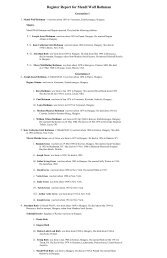
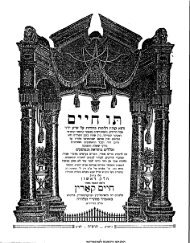
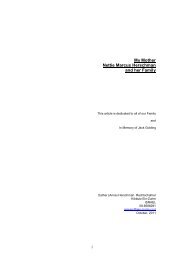
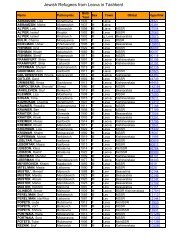
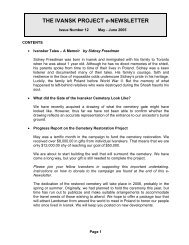
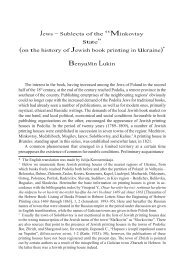
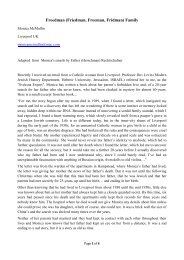
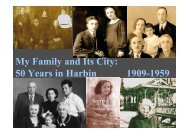

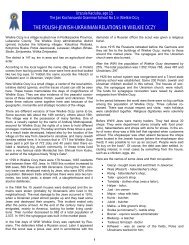
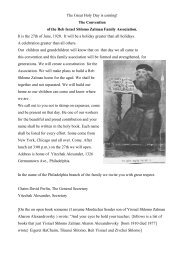
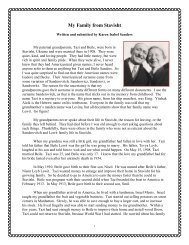
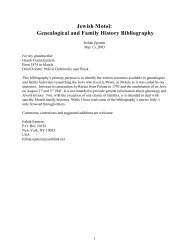
![Carta de Jaime Cesar [Negro] Lipovetzky - JewishGen KehilaLinks](https://img.yumpu.com/19183893/1/190x245/carta-de-jaime-cesar-negro-lipovetzky-jewishgen-kehilalinks.jpg?quality=85)